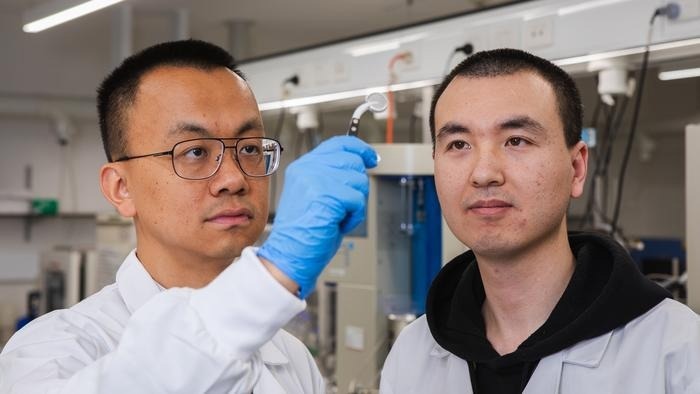A worldwide team of researchers and industry colleagues, led by RMIT University, has developed recyclable ‘water batteries’ that will not catch fire or explode.
 Distinguished Professor Tianyi Ma (left) and Dr Lingfeng Zhu at RMIT University with the team’s water battery. Image Credit: Carelle Mulawa-Richards, RMIT University
Distinguished Professor Tianyi Ma (left) and Dr Lingfeng Zhu at RMIT University with the team’s water battery. Image Credit: Carelle Mulawa-Richards, RMIT University
Lithium-ion energy storage commands the market due to its technological maturity, but its appropriateness for large-scale grid energy storage is restricted by safety concerns about the volatile ingredients used.
Lead researcher Distinguished Professor Tianyi Ma stated that their batteries were at the forefront of an emerging area of aqueous energy storage devices, with innovations that significantly enhanced the technology’s performance and longevity.
What we design and manufacture are called aqueous metal-ion batteries – or we can call them water batteries.
Tianyi Ma, Study Lead Researcher and Distinguished Professor, School of Science, RMIT University
The team replaces organic electrolytes with water, which allows electric current to flow between the positive and negative terminals, ensuring that their batteries, unlike their lithium-ion counterparts, cannot catch fire or explode.
Ma added, “Addressing end-of-life disposal challenges that consumers, industry and governments globally face with current energy storage technology, our batteries can be safely disassembled and the materials can be reused or recycled.”
He stated that the ease of their water battery manufacturing procedures contributed to mass production feasibility.
“We use materials such as magnesium and zinc that are abundant in nature, inexpensive and less toxic than alternatives used in other kinds of batteries, which helps to lower manufacturing costs and reduces risks to human health and the environment,” Ma stated.
What’s the Energy-Storage and Life-Cycle Potential?
The team created a succession of small-scale experimental batteries for multiple peer-reviewed research to address a variety of technological difficulties, including increasing energy storage capacity and longevity.
In their most recent study, published in Advanced Materials, they overcame a key challenge: the creation of disruptive dendrites, which are spiky metallic forms that can lead to short circuits and other catastrophic problems.
The researchers applied a protective layer of bismuth oxide, sometimes referred to as rust, to the damaged battery components to stop dendrite growth.
The result?
Ma stated, “Our batteries now last significantly longer – comparable to the commercial lithium-ion batteries in the market – making them ideal for high-speed and intensive use in real-world applications. With impressive capacity and extended lifespan, we've not only advanced battery technology but also successfully integrated our design with solar panels, showcasing efficient and stable renewable energy storage.”
Using as little space as possible per unit of power, the team’s water battery is catching up to lithium-ion technology in terms of energy density.
“We recently made a magnesium-ion water battery that has an energy density of 75 watt-hours per kilogram (Wh kg-1) – up to 30% that of the latest Tesla car batteries,” Ma added.
Small Structures published this research.
Ma added, “The next step is to increase the energy density of our water batteries by developing new nanomaterials as the electrode materials.”
According to Ma, magnesium will probably be the preferred material for water batteries in the future.
“Magnesium-ion water batteries have the potential to replace lead-acid battery in the short term – like one to three years – and to replace potentially lithium-ion battery in the long term, 5 to 10 years from now. Magnesium is lighter than the alternative metals, including zinc and nickel, has a greater potential energy density and will enable batteries with faster charging times and better capability to support power-hungry devices and applications,” Ma further added.
Potential Applications
According to Ma, the team’s batteries were perfect for grid storage and the integration of renewable energy sources since they were well-suited for large-scale uses, particularly with regard to safety.
Ma noted, “As our technology advances, other kinds of smaller-scale energy storage applications such as powering people’s homes and entertainment devices could become a reality.”
Technology Supported by Peer-Reviewed Research, Government Funding and Industry Engagement
Working with industry partner GrapheneX, a Sydney-based tech startup, Ma’s team is continuously improving its water batteries as part of an ARC Linkage project.
He further added, “We also collaborate closely with researchers and experts from renowned universities and research institutions in Australia, US, UK, Japan, Singapore, China and elsewhere. These collaborations facilitate knowledge exchange and access to cutting-edge facilities. By drawing on this global team’s expertise in different areas, we can tackle the complex challenges involved from various angles.”
Journal References:
Tian, X., et. al. (2024) Synergy of Dendrites-Impeded Atomic Clusters Dissociation and Side Reactions Suppressed Inert Interface Protection for Ultrastable Zn Anode. Advanced Materials. doi:10.1002/adma.202400237
Ding, Y., et. al. (2024) Bulk defect-induced phase transition assisting high-flux magnesium ions intercalation in manganese tetroxide. Energy Storage Materials. doi:10.1016/j.ensm.2023.103010
Li, M., et. al. (2024) Interface Polarization Effects Enhancing Mn2O3@TiO2@MXene Heterostructures for Aqueous Magnesium Ion Capacitors: Guided Charge Distribution and Transportation via Built-in Electric Fields. Small Structures. doi:10.1002/sstr.202300371
Sun, Y., et. al. (2024) Ammonium-ion energy storage devices for real-life deployment: storage mechanism, electrode design and system integration. Energy a& Environmental Science. doi:10.1039/D3EE02030D